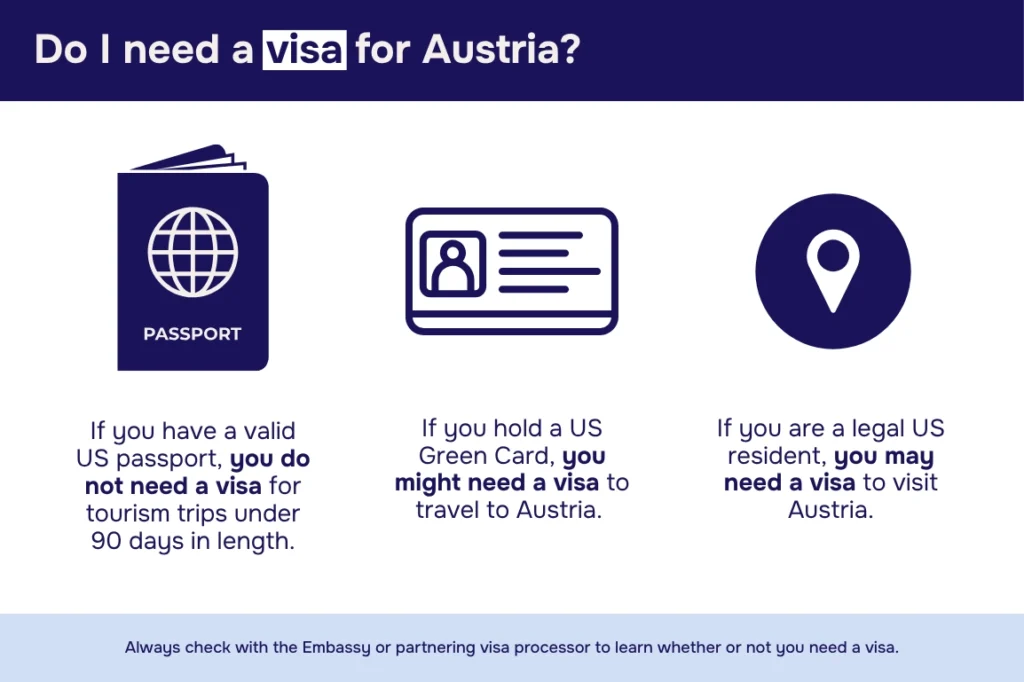Home > Applying for an Austrian Visa: Everything You Need to Know

Applying for an Austrian Visa: Everything You Need to Know
Whether you’re traveling to Vienna for work, or are ready to explore Austria’s fascinating culture and heritage (it is the birthplace of Mozart, after all!), the world of visas can feel overwhelming.
This guide will give you a comprehensive breakdown of everything you need to know about applying for an Austria visa, ensuring you have all of the knowledge you need for a hassle-free application process!
Who needs a visa for Austria
Millions of travelers go to Austria each year, but whether or not you need a visa depends on your nationality and the purpose of your visit.
Austria is part of the Schengen zone, which has specific visa rules for both short-term and long-term stays. We will get into what that means for you, so you can make the best choice for your upcoming travels.

Do US citizens need a visa for Austria?
Sometimes. For short stays (up to 90 days) related to tourism or business trips, US citizens do not need a visa to enter Austria.
However, if you're planning to stay longer or for specific purposes (like studying abroad), a visa will be required, in which case you can get an Austria visa from the USA.
How long can you stay in Austria without a visa?
If you're visa-exempt (US and UK travelers, for example), you can stay in Austria for up to 90 days (within a 180 day period).
Keep in mind that this "time limit" isn't just for Austria, it's for the entire Schengen area.
So, if you want to spend 90 days in Austria, then 90 days in France, then 90 days in Spain, etc., it isn't possible. Once you reach the 90-day limit, you must exit the Schengen area (which means you must exit any and all countries within it).
You can return again after you've been out of the area for a minimum of 90 days.
Who doesn’t need a visa to go to Austria?
Citizens from Schengen area member countries (there are 29 of them) or nations that have visa-free agreements with the EU can enter Austria without a visa.
That said, if you're a citizen of a visa-exempt country, you can only stay in Austria for up to 90 days without a visa. If you want to stay longer, you will need to apply for the appropriate visa.

How to apply for a visa for Austria
There are a few steps involved in the visa application process for Austria.
If you're not from a visa-exempt country and want to take a short trip to Austria (fewer than 90 days), you'll likely need a Type-C Short Stay Schengen Visa. That said, always check with the embassy to see which visa you need to apply for.
When applying for any type of visa for Austria, one of the first things you’ll need to do is gather all of the required documents.
Once you have all of the necessary documents, you can book an appointment and submit your application at either a visa application center or the Austrian consulate.
You cannot apply for an Austria visa online
Currently, in order to apply for a visa for Austria, you have to attend an appointment in person. This appointment needs to take place in your country of residence.
As said above, the appointment will either take place at a visa application center or at a consulate - it just depends on where you live and what services are available in your country.
In the coming years, there will be a secure, online application system for all Schengen visas (called EU VAP), but it isn’t available yet, and won't be until 2030 or later.
Is it difficult to get a visa for Austria?
The application process itself is pretty straightforward. When it comes to how likely it is that your application will be approved, that is another topic entirely.
Only the Austrian Embassy can decide whether or not a visa application is approved or denied.
Austria visa rejection rates
In 2024, 13.7% of Austrian visa applications were rejected globally.
We don't recommend using this metric to get an idea about your application's likelihood of approval.
Rejection rates are very fluid, and this metric is one snapshot for the entire globe during the entire year. In reality, rejection rates are always changing.
Austria visa processing times
For Schengen visas, processing typically takes around 15 days. Long-term visas often take longer.

Austria visa application requirements
There isn't just one type of visa for Austria, and the type that you apply for will dictate which documents you'll need to provide as part of your application.
That said, some standard documents will likely be required regardless of the specific visa you're applying for.
For Short-Stay (Type C) Schengen visas for Austria, the list below is what is required.
Required documents
Most visa applications for Austria require:
- A completed Schengen application form.
- Passport-sized photos.
- A valid passport.
- Travel insurance coverage that meets Schengen visa travel insurance requirements.
- Proof of accommodation (hotel reservation or invitation).
- Proof of sufficient financial means for your stay.
- Return flight tickets/flight itinerary.
These requirements are the basic level of what you’ll need to have ready for your application.
Some visas, especially long-stay and/or work visas, will have additional requirements, such as specific forms from the enterprise or institution you’re working with, proof of professional mastery, and more.
When you start the application process, the visa application center or consulate will give you a checklist of which documents you'll need.
Planning a trip to Austria? ☕️
Don't forget travel insurance - especially if you're applying for a Schengen visa!

Your Austria visa appointment
Currently, in-person appointments are mandatory when applying for an Austrian visa, whether it’s a short-term visa or a long-term one.
Interviews focus on checking that you have all of the required documents there and ready.
You will also provide biometrics (fingerprints) at your appointment (unless you have already in the past 5 years).
Austria visa costs
Visa fees depend on the type of visa.
A Schengen visa costs €90 for adults, while long-term visas (or, national visas) may have higher fees. Children under the age 12 are €45, and children under the age of six are free.
These fees can also change from time to time, so make sure you always check with your visa processor.

FAQs: Austria Schengen Visas
Austria visas and ETIAS
If you hold a valid visa for Austria (including a Schengen visa), you do not need to obtain ETIAS approval before traveling. To learn more about this, please refer to our Austria ETIAS guide.

If You Have a Passport From One of These Countries, You Can Move to Austria
Austria recently released a new visa for travelers from specific countries.
This visa is the Austria Working Holiday Visa, sometimes referred to as the Austria WHV.
Travelers with this visa can stay in Austria for 6-12 months (depending on the program) and take up work or education during their stay.
The WHV will open up more opportunities for foreigners who want to explore Europe for a longer period of time.

The Austria working holiday visa: who can apply
This program is available for citizens ages 18-30 of the following countries:
- The United States of America
- Argentina
- Australia
- Chile
- Hong Kong
- Israel
- Japan
- India
- Canada
- New Zealand
- The Republic of Korea
- Chinese Taipei
If you hold a passport from any of the above countries, you may be eligible. There are a few other eligibility requirements you'll need to meet, too.

Austria Working Holiday Visa requirements for US citizens
To apply for the Austria WHV, you need to meet the following requirements:
- You must be between the ages of 18-30. You can apply before you turn 18, but you must be 18 when you leave for your trip.
- You have to have graduated with a US degree, diploma, or certificate in the past 12 months.
- You must be able to show you can financially support yourself for the initial part of your stay, since you will be allowed to take up work in Austria.
When you apply, you'll need to provide
- Proof of your recent degree/diploma/certificate.
- A Visa Type D application form filled out completely and signed.
- A biometric passport photo that meets specific requirements.
- Your US passport.
- Schengen travel insurance that meets specific requirements (such as a 30,000 euro minimum for emergency medical).
- Proof of financial means for the initial portion of your trip.
- Proof of transport/means to purchase an ongoing flight.
- Criminal record certificate.
Where to apply
You can apply at the Austrian Embassy or Consulates in the US.
If you're currently a legal resident in the Schengen area, you can apply at the Austrian Embassy in Ljubljana, Bratislava, and London. You can also apply at the Consulate in Munich.
Keep in mind that you will need to submit your application three months before your intended stay (at the earliest), and that you cannot apply once you're in Austria.

How long is Austria's Working Holiday Visa?
The duration depends on which country issued your passport.
The US
The Austria WVH visa allows you to stay in Austria for a maximum of 12 months. Unfortunately, this visa cannot be renewed.
Argentina
Argentinians can stay for 12 months. However, they cannot work for the same Austrian employer for more than 6 months. Your application can only be submitted at the Austrian Embassy in Buenos Aires.
Australia
Up to 12 months without the ability to extend it. In order to apply, you need to have evidence of a college degree/diploma, or at least two years of higher education.
Hong Kong
Up to 12 months. Your application can only be submitted at the Consulate General in Hong Kong.
Japan
Up to 12 months. Japanese citizens may repeat their working holiday.
India
Up to 12 months. Your application has to be submitted to the Austrian Embassy in Delhi.
Canada
With the Austria Working Holiday Visa, you can reside in Austria for up to 12 months.
Chinese Taipei
This visa allows you to stay for up to 12 months and has to be submitted to the Austrian Office in Chinese Taipei.
